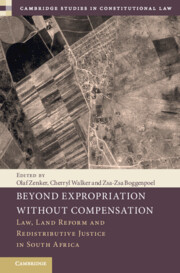Acknowledgements
This volume is the outcome of a research project that Olaf Zenker proposed to the Stellenbosch Institute for Advanced Study (STIAS), based in Stellenbosch, South Africa, in 2018. At the time, the official process to review the ‘property clause’ of the South African Constitution had just started and was rapidly gathering pace. Aimed at potentially amending the Constitution to allow for ‘expropriation without compensation’, this process fanned heated public debates and led to a prolonged legislative process with what were, in many ways, uncertain results.
From the start, the research project planned to interrogate these developments in South African land reform and transformative constitutionalism critically, within a broader framework encompassing redistributive justice more generally. Zenker proposed facilitating a constructive exchange amongst specialists in the fields of property law, land reform and redistributive justice (initially Cherryl Walker, Zsa-Zsa Boggenpoel and James Ferguson), leading to an international STIAS conference, followed by an accessible publication of the results of this exchange. This was envisioned as offering both critical commentary on and policy input for the redistributive transformation that South Africa so urgently needs.
While carrying the project through from beginning to end, Zenker was joined by Cherryl Walker, followed by Zsa-Zsa Boggenpoel, as co-organisers of the conference. Our collaboration was facilitated by a STIAS group residency that was scheduled around the conference, which was finally able to take place, post-COVID, in February 2022. The three of us then constituted the editorial team that jointly took forward the book project thereafter.
The fact that this volume now exists, bringing this project to a fruitful conclusion, would not have been possible without the unwavering support of STIAS – notably its former and current directors, Hendrik Geyer and Edward Kirumira, as well as other STIAS personnel, especially Programme Manager Christoff Pauw, as well as Nel-Mari Loock, Georgina Humphreys, Noloyiso Mtembu and Elize du Plessis. Many thanks to you all and to STIAS as an institution for your intellectual, logistical and financial support for this project, including the excellent conference and this open-access publication with Cambridge University Press.
In addition to the generous assistance of STIAS, further institutions and people contributed substantially to the success of this project and deserve our thanks. Both the conference and this publication were supported in part by the National Research Foundation (NRF) of South Africa (Grant Numbers 98765 and 64838); we are grateful for this assistance, while acknowledging that the opinions, findings, conclusions and recommendations expressed in this publication are those of the authors alone and that the NRF accepts no liability whatsoever in this regard. We would also like to thank Chantelle Louw for her assistance with the initial copy-editing of draft chapters for the manuscript.
In addition, Martin Luther University Halle-Wittenberg, Germany, provided a sabbatical semester 2021/2022, allowing Olaf Zenker to focus on the organisation and realisation of the conference in the context of the STIAS group residency as well as the substantial reviewing in preparation for this book. In the context of the conference ‘After Law: Mobilization, Injustice, and Confrontation in the Post-Juristocratic Transition’, co-organised with Mark Goodale at the University of Lausanne, Switzerland, in June 2022, Olaf Zenker profited from spirited discussions with Penelope Anthias, Matthew Canfield, Lynette Chua, Kamari Clarke, Andrea Freeman, Mark Goodale, Arzoo Osanloo, Nitzan Shoshan and Rachel Sieder on the conundrums of South African transformative constitutionalism, as exemplified in the recent debate on expropriation without compensation. More recently, a fellowship at Käte Hamburger Kolleg Münster ‘Legal Unity & Diversity’ facilitated the co-authored Introduction to this volume as well as the overall book manuscript. Over the years, Olaf Zenker also benefited greatly from many engaging exchanges with his Halle students in the context of seminars on colonial dispossession and post-colonial redress, conflicting property regimes under conditions of legal pluralism, and land justice in southern Africa.
Cherryl Walker’s participation in the project was supported by the South African Research Chair in the Sociology of Land, Environment and Sustainable Development, located in the Department of Sociology and Social Anthropology at Stellenbosch University (DSI/NRF SARChI Grant 98765). She is grateful for the many opportunities the Chair has afforded her since 2016, including the camaraderie, collegiality and intellectual commitments of ‘Cosmopolitan Karoo’ core team members and of research partners too numerous to list individually here.
Zsa-Zsa Boggenpoel’s participation in the project was supported by the South African Research Chair in Property Law, located in the Law Faculty at Stellenbosch University (DSI/NRF SARChI Grant 64838). She is also grateful to the NRF for the opportunities the Research Chair has afforded her, including enriching collaboration with colleagues and postgraduate students.
Last but not least, this extended project would not have been possible without the ongoing support, patience and encouragement of our respective families. Julia, Nele and Max (Zenker); John, Zac and Cai Crumley (Walker); Blake, Zac and Matthew (Boggenpoel): our deep thanks to you all!

